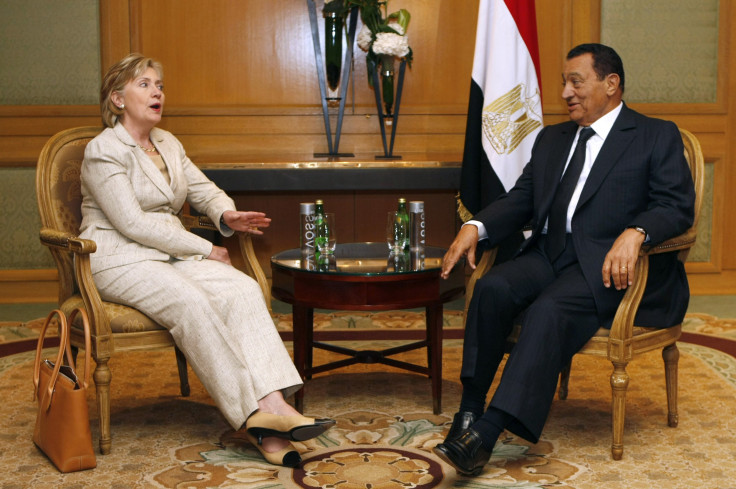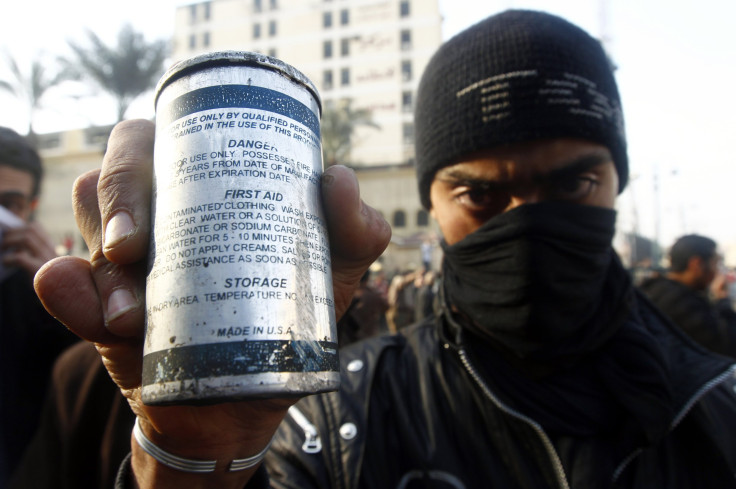Hillary Clinton's State Department Increased Chemical Arms Sales To Middle East Countries That Gave To Clinton Foundation

As Egyptian democracy protesters massed in the streets of Cairo in 2011, provoking a bloody crackdown from the authoritarian regime of Hosni Mubarak, U.S. Secretary of State Hillary Clinton presented herself as a champion of human rights. Clinton was “deeply concerned about the use of violence by Egyptian police and security forces against protesters,” she told reporters at the State Department. “Egyptian authorities,” she urged, should not impede “peaceful protests.”
But behind the scenes, Clinton pursued contrasting aims. She cautioned the White House about backing the ouster of President Mubarak, whom she had previously described as a family friend. Her State Department cleared Egypt to continue purchasing arms the U.S. government classified as "toxicological agents,” a broad designation that included chemical and biological weapons, as well as vaccines -- this, at the very moment Mubarak’s forces were unleashing one toxicological agent, tear gas, against protesters demanding his ouster.
The Clinton-run State Department’s approval of chemical and biological exports to the Egyptian government increased in volume just as dollars flowed from Mubarak-linked entities into the coffers of Clinton family concerns. A group closely associated with the Mubarak government paid Bill Clinton a $250,000 speaking fee in 2010, less than 4 months before the Egyptian revolution began. In 2012, a firm with an ownership stake in the company that manufactured the tear gas reportedly used by Egyptian security forces against the uprising paid $100,000 to $250,000 for another Bill Clinton speech.

The approval of American chemical weapons sales to Egypt as Mubarak’s associates were stocking Clinton family interests with cash is but one example of a dynamic that prevailed though Hillary Clinton’s tenure as secretary of state. During the roughly two years of Arab Spring protests that confronted authoritarian governments with popular uprisings, Clinton’s State Department approved $66 million worth of so-called Category 14 exports -- defined as "toxicological agents, including chemical agents, biological agents and associated equipment" -- to nine Middle Eastern governments that either donated to the Clinton Foundation or whose affiliated groups paid Bill Clinton speaking fees.
That represented a 50 percent overall increase in such export approvals to the same countries over the two years prior to the Arab Spring, according to an International Business Times review of State Department documents. In the same time period, Arab countries that did not donate to the Clinton Foundation saw an overall decrease in their State Department approvals to purchase chemical and biological materials. The increase in chemical, biological and related exports to Clinton Foundation donors was part of a larger jump in overall arms sales authorized by Hillary Clinton’s State Department to foreign governments that gave her family’s foundation at least $54 million, according to a previous IBTimes analysis.
The State Department, the Clinton campaign and the Clinton Foundation did not respond to questions about the deals.
The donations to the Clinton Foundation and the concurrent increase in export approvals of toxicological, biological and chemical agents and associated hardware raise questions about whether the contributions improperly influenced arms export decisions, said Kathleen Clark, a law professor at Washington University in St. Louis.
“The goal of conflicts-of-interest standards and government ethics standards is to set up a system where the public can be confident that officials are a making decisions on their merits, and not that there is a financial stake in the matter,” Clark told IBTimes. “Did these donations influence State Department decision-making? Why did they donate to the Clinton Foundation? Is it possible that they perceived that the donation would ingratiate themselves -- or not -- with policymakers?”
Prior to Clinton’s tenure at State, Congress and the public could see some of the details of Category 14 exports. Those interested in scrutinizing the sales were supplied a breakdown of the transactions into separate categories such as “tear gases and riot control” and other wares classified as “medical countermeasures” like vaccines to protect against exposure to chemical and biological warfare. But as Clinton’s State Department increased its export approvals, it also stopped providing a breakdown of such exports. Key details are now effectively secret.
Transparency advocates complain the absence of a breakdown enables the State Department to approve weapons deals without providing a public accounting.
"In the past, we were able to pinpoint specific exports that may have been counter to State Department policy, and hand that information to the State Department and they would take action," said Colby Goodman, a senior research associate with the Center for International Policy. "Now, that's not possible.” He added: “We expressed our concerns to the State Department, but they have failed to take action."
A state department official told IBTimes that under Clinton, the department decided it didn't need to report granular details of weapons exports to be fully compliant with congressional reporting requirements. The official even asserted the Clinton-led department's procedure was "more transparent."
The reports released by Clinton's state department since 2010 disclose overall export numbers. For instance, in 2010, export authorizations to Egypt’s government for chemical and biological agents saw a one-year, 38 percent increase in the lead-up to the revolution against Mubarak’s government. That year, the Mubarak-aligned American Chamber of Commerce in Egypt paid Bill Clinton $250,000. Two close Mubarak allies were past presidents of the group, one of whom reportedly was sent to lobby Washington against a proposed resolution that would call on Mubarak to have free and fair elections.
In all, in the two years after Bill Clinton was paid by the Mubarak-aligned group -- and as uprisings against the Egyptian government swept the country -- the Clinton-led State Department backed a 12 percent increase in exports to Egypt in the biological and chemical agents category.
Secretary Clinton seemed to pursue contradictory policies where Egypt was concerned. Autocratic governments have used chemical weapons to suppress internal dissent, and in 2011, Clinton announced as part of her support for an international treaty that outlaws the stockpiling of chemical weapons, she would “reaffirm our commitment to finish the job” of eliminating such stockpiles. But U.S. approvals for the exports of Category 14 weapons to Cairo increased even though Egypt was one of only three countries whose governments have taken no action to sign or ratify the treaty. (The other two are North Korea and South Sudan.)
“It's widely believed that Egypt has stockpiled offensive chemical weapons," said Daryl Kimball, executive director of the Arms Control Association.
In 2011, ABC News reported that Egyptians protesting against Mubarak were attacked by the regime’s police with tear gas made by an American company called Combined Systems Inc. (Tear gas is considered a chemical weapon under the Chemical Weapons Convention, and is banned in wartime.) That firm is part-owned by the Carlyle Group, which paid the Clinton Foundation for a Bill Clinton speech in 2012 though the Clinton Foundation did not disclose it at the time. In all, the Carlyle Group has donated at least $350,000 to the foundation, including a fee for a Hillary Clinton speech months after she left office in 2013.
The Carlyle Group declined to answer questions from IBTimes.
Some Clinton Foundation donors from the Middle East did not see an increase in authorizations for toxicological agents during the Arab Spring, but did see big increases earlier, soon after Clinton came into office in 2009.
Algeria received just $2,110 worth of State Department authorizations in the chemical and biological weapons category in fiscal 2008. But the next fiscal year -- 80 percent of which was under Clinton’s tenure -- the country received more than $6 million worth of such Category 14 authorizations. Five-point-eight million dollars of the authorizations were for items classified as “tear gases and riot control agents.” The next year, the Algerian government gave the Clinton Foundation $500,000. Amid the Arab Spring revolts in 2011, Algerian security forces used tear gas on protesters in the capital.
In a similar instance, Saudi Arabia received a little less than $5 million in Category 14 authorizations in 2008 and 2009, but then in 2010 -- Clinton’s first full fiscal year in office -- the State Department approved $18 million of such authorizations. Saudi Arabia is one of the Clinton Foundation’s largest donors, having given at least $10 million in the years before Hillary Clinton became secretary of state.
Because Clinton’s State Department stopped detailing its arms approvals, congressional lawmakers and the public cannot discern if the U.S. gave the Saudis and other autocratic regimes offensive weapons like tear gas (or more deadly substances) or defensive equipment to protect soldiers from chemical exposure.
“The public has the right to know the details about these deals,” said Joe Newman, a spokesperson for the Project on Government Oversight, a nonpartisan watchdog group. “There would need to be an extraordinary national security concern to keep the public from knowing what weapons we're exporting to foreign governments. We can't think of a good example of when the public should be kept in the dark.”
© Copyright IBTimes 2025. All rights reserved.






















